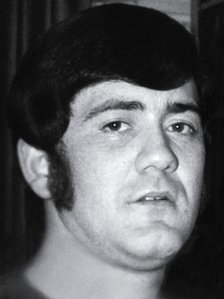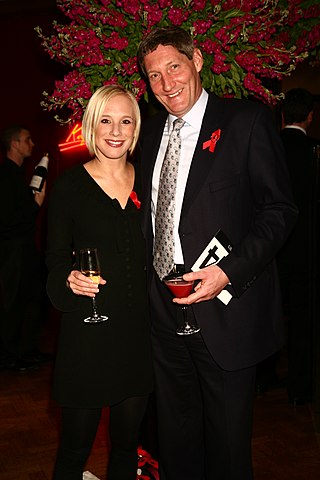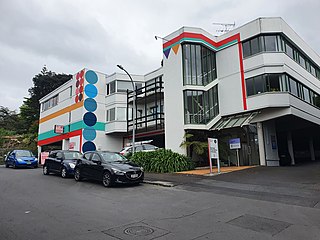Related Research Articles
Men who have sex with men (MSM) are men who engage in sexual activity with other men, regardless of their sexual orientation or sexual identity. The term was created by epidemiologists in the 1990s, to better study and communicate the spread of sexually transmitted infections such as HIV/AIDS between all sexually active males, not strictly those identifying as gay, bisexual, pansexual or various other sexualities, but also for example male prostitutes. The term is often used in medical literature and social research to describe such men as a group. It does not describe any specific kind of sexual activity, and which activities are covered by the term depends on context. The alternative term "males who have sex with males" is sometimes considered more accurate in cases where those described may not be legal adults.

Terrence Higgins Trust is a British charity that campaigns about and provides services relating to HIV and sexual health. In particular, the charity aims to end the transmission of HIV in the UK; to support and empower people living with HIV, to eradicate stigma and discrimination around HIV, and to promote good sexual health.

Terrence Lionel Seymour Higgins was among the first people known to die of an AIDS-related illness in the United Kingdom.

Sir Nicholas Wyndham Partridge is an English healthcare and HIV/AIDS care activist.
AIDS was first diagnosed in 1981. As of year-end 2018, 160,493 people have been diagnosed with HIV in the United Kingdom and an estimated 7,500 people are living undiagnosed with HIV. New diagnoses are highest in gay/bisexual men, with an estimated 51% of new diagnosis reporting male same-sex sexual activity as the probable route of infection. Between 2009 and 2018 there was a 32% reduction in new HIV diagnosis, attributed by Public Health England (PHE) to better surveillance and education. PHE has described an "outbreak" in Glasgow amongst people who inject drugs, and has campaigns targeting men who have sex with men in London and other major cities. London was the first city in the world to reach the World Health Organization target for HIV, set at 90% of those with HIV diagnosed, 90% of those diagnosed on HAART and 90% of those on HAART undetectable. The UK as a whole later achieved the same target. Under the Equality Act 2010, it is illegal to discriminate against someone based on their HIV status in the UK.
CRUSAID was a British charity that provided financial assistance during the AIDS epidemic to institutions and to people suffering from HIV/AIDS. In 1996, the charity had close to £11 million in assets
The history of HIV/AIDS in Australia is distinctive, as Australian government bodies recognised and responded to the AIDS pandemic relatively swiftly, with the implementation of effective disease prevention and public health programs, such as needle and syringe programs (NSPs). As a result, despite significant numbers of at-risk group members contracting the virus in the early period following its discovery, Australia achieved and has maintained a low rate of HIV infection in comparison to the rest of the world.

Switchboard is the second-oldest LGBT+ telephone helpline in the United Kingdom, launched the day after Edinburgh Befrienders.
The National AIDS Trust is a United Kingdom charity with the purpose to stand alongside and defend the rights of everyone living with, affected by or at risk of HIV. Its expertise, research and advocacy secure lasting change to the lives of people living with and at risk of HIV. The charity's key strategic goals are:

The Burnett Foundation Aotearoa is New Zealand’s national HIV prevention and healthcare organisation. Its funding is derived from grants, donations and the Ministry of Health.
Rupert Edward David Whitaker is a British psychiatrist, immunologist, and patient advocate. He is one of Europe's longest-surviving people with HIV, having contracted the disease in 1981. Following the death of his partner, Terrence Higgins, from AIDS in 1982, he co-founded the Terrence Higgins Trust, a charity set up to provide services for people with HIV. In 2007, he founded the Tuke Institute, an international organisation researching the health-effectiveness of medical services.

The MSM blood donor controversy in the United Kingdom refers to the former deferral policy of men who have had sex with men (MSM) in the United Kingdom who wish to donate their blood to UK blood donation services. Since June 2021, there is no deferral period in all four home nations. This followed an announcement in December 2020 that blood donation policies specific to MSM would be scrapped in favour of personalised risk assessment based on sexual behaviour.

Founded in 1999, Alliance India is a non-governmental organisation operating in partnership with civil society, government and communities to support sustained responses to HIV in India that protect rights and improve health. Complementing the Indian national programme, we build capacity, provide technical support and advocate to strengthen the delivery of effective, innovative, community-based HIV programmes to vulnerable populations: sex workers, men who have sex with men (MSM), transgender people, hijras, people who inject drugs (PWID), and people living with HIV.
Since reports of emergence and spread of the human immunodeficiency virus (HIV) in the United States between the 1970s and 1980s, the HIV/AIDS epidemic has frequently been linked to gay, bisexual, and other men who have sex with men (MSM) by epidemiologists and medical professionals. It was first noticed after doctors discovered clusters of Kaposi's sarcoma and pneumocystis pneumonia in homosexual men in Los Angeles, New York City, and San Francisco in 1981. The first official report on the virus was published by the Center for Disease Control (CDC) on June 5, 1981, and detailed the cases of five young gay men who were hospitalized with serious infections. A month later, The New York Times reported that 41 homosexuals had been diagnosed with Kaposi's sarcoma, and eight had died less than 24 months after the diagnosis was made.
galck+, formerly The Gay and Lesbian Coalition of Kenya (GALCK), is the national Sexual Orientation Gender Identity and Expression (SOGIE) umbrella body, representing LGBTQ+ voices across Kenya.

Lisa Power MBE is a British sexual health and LGBT rights campaigner. She was a volunteer for Lesbian & Gay Switchboard and Secretary General of the International Lesbian and Gay Association. She co-founded the Pink Paper and Stonewall, later becoming Policy Director at the Terrence Higgins Trust. She was the first openly LGBT person to speak at the United Nations and continues to work and volunteer as an LGBT+ and sexual health activist in Wales with groups such as Fast Track Cymru and Pride Cymru.
Multiple sex partners (MSP) is the measure and incidence of engaging in sexual activities with two or more people within a specific time period. Sexual activity with MSP can happen simultaneously or serially. MSP includes sexual activity between people of a different gender or the same gender.
Margaret Denise Portman was a British medical doctor who specialised in sexual health. She was an advocate for pre-exposure prophylaxis medication (PrEP) to prevent new HIV cases.
Scottish AIDS Monitor (SAM) was a Scottish HIV and AIDS awareness organisation that was active between 1983 and 1996.

Jonathan Blake is a British gay rights activist and former member of Lesbians and Gays Support the Miners (LGSM). He was one of the first people diagnosed with HIV in the United Kingdom and is one of the country's oldest surviving people with the illness.